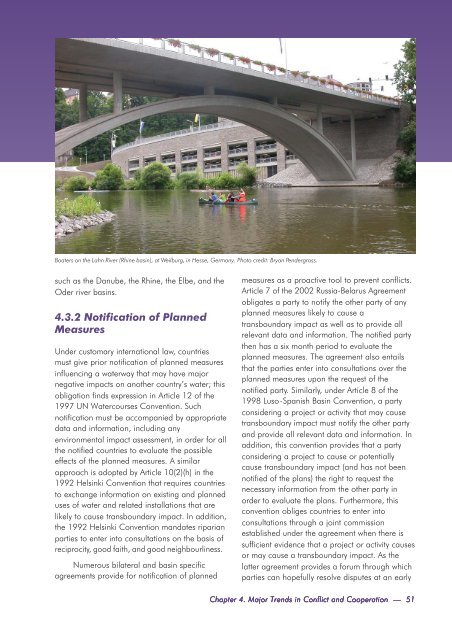Europe - UNEP
Europe - UNEP
Europe - UNEP
Create successful ePaper yourself
Turn your PDF publications into a flip-book with our unique Google optimized e-Paper software.
Boaters on the Lahn River (Rhine basin), at Weilburg, in Hesse, Germany. Photo credit: Bryan Pendergrass.<br />
such as the Danube, the Rhine, the Elbe, and the<br />
Oder river basins.<br />
4.3.2 Notification of Planned<br />
Measures<br />
Under customary international law, countries<br />
must give prior notification of planned measures<br />
influencing a waterway that may have major<br />
negative impacts on another country’s water; this<br />
obligation finds expression in Article 12 of the<br />
1997 UN Watercourses Convention. Such<br />
notification must be accompanied by appropriate<br />
data and information, including any<br />
environmental impact assessment, in order for all<br />
the notified countries to evaluate the possible<br />
effects of the planned measures. A similar<br />
approach is adopted by Article 10(2)(h) in the<br />
1992 Helsinki Convention that requires countries<br />
to exchange information on existing and planned<br />
uses of water and related installations that are<br />
likely to cause transboundary impact. In addition,<br />
the 1992 Helsinki Convention mandates riparian<br />
parties to enter into consultations on the basis of<br />
reciprocity, good faith, and good neighbourliness.<br />
Numerous bilateral and basin specific<br />
agreements provide for notification of planned<br />
measures as a proactive tool to prevent conflicts.<br />
Article 7 of the 2002 Russia-Belarus Agreement<br />
obligates a party to notify the other party of any<br />
planned measures likely to cause a<br />
transboundary impact as well as to provide all<br />
relevant data and information. The notified party<br />
then has a six month period to evaluate the<br />
planned measures. The agreement also entails<br />
that the parties enter into consultations over the<br />
planned measures upon the request of the<br />
notified party. Similarly, under Article 8 of the<br />
1998 Luso-Spanish Basin Convention, a party<br />
considering a project or activity that may cause<br />
transboundary impact must notify the other party<br />
and provide all relevant data and information. In<br />
addition, this convention provides that a party<br />
considering a project to cause or potentially<br />
cause transboundary impact (and has not been<br />
notified of the plans) the right to request the<br />
necessary information from the other party in<br />
order to evaluate the plans. Furthermore, this<br />
convention obliges countries to enter into<br />
consultations through a joint commission<br />
established under the agreement when there is<br />
sufficient evidence that a project or activity causes<br />
or may cause a transboundary impact. As the<br />
latter agreement provides a forum through which<br />
parties can hopefully resolve disputes at an early<br />
Chapter 4. Major Trends in Conflict and Cooperation — 51
















